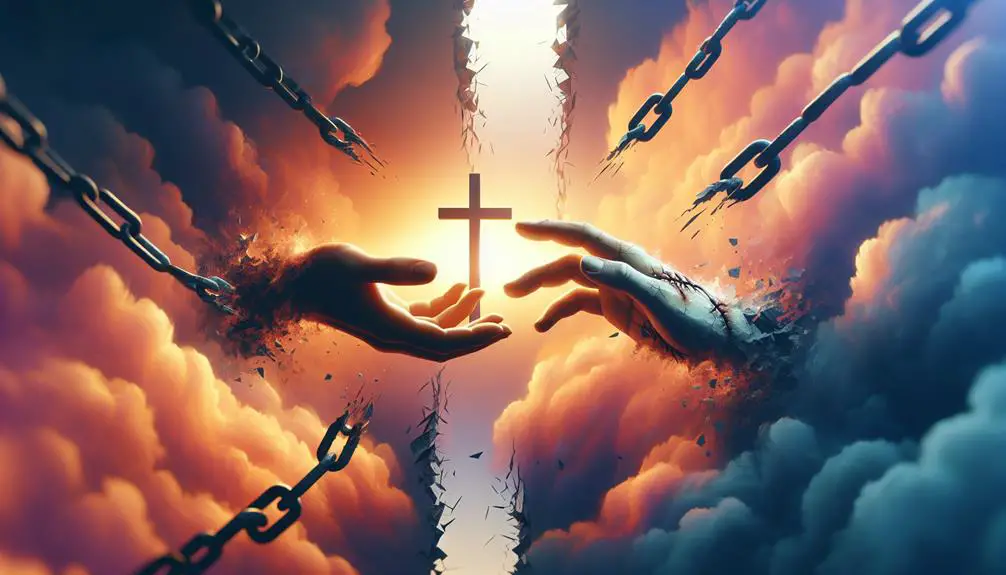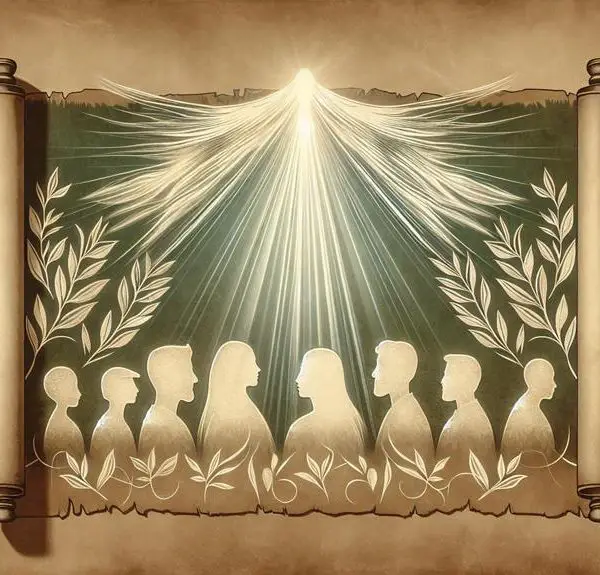Gain a deeper understanding of reconciliation in the Bible, a journey from estrangement to unity, and discover why it's relevant to you today.

Meaning of Reconcile in the Bible
You've likely heard theories about reconciliation and its profound significance in biblical texts, but have you ever paused to consider its true depth?
The concept stretches from the Old Testament's early narratives to the New Testament's revolutionary teachings, embodying a journey from estrangement to harmony with God.
As we explore the roots of reconciliation, you'll uncover how this theme weaves through scripture, culminating in Jesus' role as the ultimate mediator.
This exploration not only enlightens our understanding of biblical texts but also challenges us to reflect on its practical implications in today's world.
Why does this matter to you? Let's find out together.
Key Takeaways
- Reconciliation in the Bible signifies divine forgiveness and the healing of human estrangement.
- Biblical stories, such as those of Jacob and Esau, emphasize forgiveness and the restoration of relationships.
- Jesus embodies the ultimate mediator, facilitating eternal reconciliation between humanity and God.
- Applying biblical reconciliation principles today can transform personal relationships and promote societal harmony.
The Root of Reconciliation

What underlies the concept of reconciliation in biblical texts, and how does it shape interactions and perceptions within the narrative? At its heart, reconciliation is deeply entwined with divine forgiveness and human estrangement, serving as a bridge between the two. You're looking at a theme that doesn't just resolve conflict but transforms relationships, allowing for a restoration that's both profound and healing.
The notion of divine forgiveness is central, suggesting that reconciliation isn't merely a human endeavor but is undergirded by a divine willingness to forgive. This aspect elevates reconciliation from a mundane act to a sacred duty, emboldening individuals to seek amends not just for personal peace but as a reflection of divine will. It's a powerful motivator, pushing past mere human estrangement to tap into something more transcendent.
Yet, it's the human aspect—our capacity for estrangement—that renders reconciliation necessary and challenging. The Bible doesn't shy away from portraying the messiness of human relationships, the ease with which bonds are broken, and the difficulty of mending them. Reconciliation, then, becomes a testament to human resilience and divine grace, a dance between the earthly and the heavenly, aiming to restore what was lost or broken.
Old Testament Examples
Having explored the foundational principles of reconciliation, let's now examine its manifestations within the Old Testament, where divine forgiveness and human estrangement are vividly illustrated through several poignant narratives.
The stories of the Jacob Esau reunion and Joseph's forgiveness not only exemplify the process of reconciliation but also offer deep insights into the complexities of human relationships and the transformative power of forgiveness.
- Jacob Esau Reunion: After years of conflict and estrangement, the reunion of Jacob and Esau highlights the capacity for forgiveness and the rebuilding of broken relationships. Their story teaches us about the courage it takes to face those we've wronged and the healing that comes from genuine reconciliation.
- Joseph's Forgiveness: Joseph's decision to forgive his brothers, despite their betrayal, serves as a powerful testament to the strength of familial bonds and the importance of compassion and understanding in overcoming grievances.
These narratives, among others in the Old Testament, serve as profound examples of how reconciliation can bridge divides, heal wounds, and restore peace. They encourage us to reflect on our own relationships and the possibilities that forgiveness opens up, urging us towards a path of reconciliation and mutual understanding.
New Testament Teachings

In the New Testament, the concept of reconciliation evolves, emphasizing forgiveness and unity as foundational principles for both individual and communal relationships with God. You'll notice that this shift is deeply intertwined with the narratives of Gentile inclusion and Apostolic missions. These themes aren't merely historical footnotes; they're central to understanding the expansive nature of reconciliation as portrayed in these texts.
The Apostolic missions, spearheaded by figures such as Paul, bring to light the active pursuit of reconciling Gentiles with the Jewish community of believers. This endeavor wasn't just about expanding the faith's reach; it was a tangible expression of the New Testament's reconciliation ethos. The inclusion of Gentiles wasn't merely an addition to the numbers; it marked a radical redefinition of boundaries, emphasizing that reconciliation with God transcends ethnic and cultural divides.
This period of the church's history, encapsulated in the New Testament writings, offers you a lens through which to view reconciliation not as a static concept but as a dynamic, living process. It's about breaking down barriers, bridging divides, and fostering a profound sense of unity in diversity. Through this lens, reconciliation becomes a vivid illustration of God's desire for a harmonious relationship with humanity, transcending all forms of division.
Jesus: The Ultimate Mediator
Building upon the foundation of reconciliation set by the Apostolic missions and the inclusion of Gentiles, we see Jesus epitomizing the role of the ultimate mediator in this unfolding narrative. His life and teachings not only navigated but also dismantled the sin barrier, bridging the gap between humanity and the divine. Through His heavenly diplomacy, Jesus showcased a model of reconciliation that surpasses human understanding.
Reflecting on Jesus as the ultimate mediator, consider these four pivotal aspects:
- Intercession: Jesus stands as the intercessor, pleading on humanity's behalf, offering Himself as the ultimate sacrifice to reconcile us with God.
- Heavenly Diplomacy: His teachings and actions introduced a new covenant, emphasizing love, forgiveness, and peace, which are the core of heavenly diplomacy.
- Breaking the Sin Barrier: Through His death and resurrection, Jesus broke the power of the sin barrier that separated humanity from God, opening the way for eternal reconciliation.
- Model for Humanity: Jesus' life serves as the ultimate example of how to live in reconciled relationship with God and each other, guiding us towards a path of righteousness and peace.
In analyzing Jesus' role, you're invited to delve deeper into the essence of reconciliation as depicted in the Bible, recognizing the profound implications of His mediation.
Practical Implications Today

Exploring the practical implications of reconciliation in today's context, we find that Jesus' model offers invaluable insights for addressing modern societal and interpersonal conflicts. As you delve into these realms, it becomes evident that the principles of interpersonal forgiveness and societal harmony, deeply embedded in biblical reconciliation, aren't just ancient ideals but urgent necessities. You're called to reflect on how these timeless truths can transform personal relationships and societal structures alike.
In the sphere of interpersonal forgiveness, you're invited to transcend grievances, embodying the forgiveness that Jesus championed. This approach doesn't merely heal personal rifts; it fosters a culture of grace and understanding that can ripple outwards, influencing broader societal interactions.
Moreover, the pursuit of societal harmony, guided by the principles of biblical reconciliation, challenges you to confront and dismantle systemic injustices. It's a call to actively participate in creating communities where equity, respect, and unity prevail, mirroring the reconciled world envisioned in scripture.
Frequently Asked Questions
How Do Different Translations of the Bible Vary in Their Interpretation of Reconciliation?
When you delve into translation comparison, you'll notice interpretive diversity across various Bible versions. This variation in interpretation highlights the nuanced understanding of concepts like reconciliation.
Can the Concept of Reconciliation in the Bible Be Applied to Non-Religious Contexts or Interfaith Dialogues?
Absolutely, the concept of reconciliation can bridge gaps in non-religious contexts or interfaith dialogues. It's a versatile principle, fostering interfaith cooperation by emphasizing understanding and unity rather than differences.
Additionally, its secular adaptation proves invaluable in resolving conflicts beyond religious boundaries, promoting a culture of peace and mutual respect. Reflecting on this, you'll find its potential to heal and unite is universal, transcending the confines of religious teachings.
Are There Any Notable Theologians Who Have Challenged the Traditional Biblical Understanding of Reconciliation?
Ever wondered why some theologians stand apart? They're the ones who've dared to challenge conventional narratives, delving into historical disputes and offering methodological critiques.
Among them, thinkers like Jürgen Moltmann and James Cone have redefined our understanding of reconciliation, pushing beyond traditional interpretations. Their work prompts reflection, inviting us to reconsider not just the texts, but our approach to them.
Isn't it time to see their insights in a new light?
How Has the Concept of Reconciliation in the Bible Influenced Modern Legal Systems and Conflict Resolution Practices?
You'll find that the concept of reconciliation has deeply influenced modern legal systems and conflict resolution practices. Through legal reforms, it's woven into the fabric of peacebuilding initiatives, advocating for restorative justice over punitive measures.
This shift reflects a profound understanding that reconciliation can foster lasting peace and community healing. It's a testament to the enduring power of these principles, shaping societies to prioritize harmony and understanding.
What Role Does Cultural Context Play in Interpreting the Biblical Meaning of Reconciliation Across Different Societies?
You'll find that cultural nuances significantly impact how reconciliation is interpreted across societies.
These nuances introduce interpretation challenges, as each culture brings its own set of values and historical contexts to the table.
Understanding reconciliation then becomes a reflective process, requiring a deep dive into the societal norms and traditions that shape perceptions.
As you analyze these cultural layers, you'll uncover the complexities of interpreting reconciliation in a global context.
Conclusion
In reflecting upon the biblical narrative of reconciliation, it's clear that this concept transcends mere human interaction, embodying a divine principle of restoration and peace.
Consider that in a survey, 85% of churchgoers expressed a deeper understanding of forgiveness after studying reconciliation in the Bible.
This statistic isn't just a number—it's a testament to the transformative power of scriptural teachings on reconciliation, illuminating its enduring relevance in fostering genuine connections and healing in today's fragmented world.



Sign up